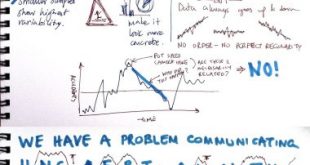Every dollar of increased government spending must correspond to one less dollar of private spending. Jobs created by stimulus spending are offset by jobs lost from the decline in private spending. We can build roads instead of factories, but fiscal stimulus can’t help us to build more of both. This form of “crowding out” is just accounting, and doesn’t rest on any perceptions or behavioral assumptions. John Cochrane What Cochrane is reiterating here is nothing but Say’s law,...
Read More »Nothing compares (personal)
[embedded content] Today is Mother’s Day in Sweden. This one is in loving memory of my mother Lisbeth, and of Kristina, beloved wife and mother of David and Tora. Those whom the gods love die young. But in dreams, I can hear your name. And in dreams, We will meet again. When the seas and mountains fall And we come to end of days, In the dark I hear a call Calling me there I will go there And back again. div{float:left;margin-right:10px;} div.wpmrec2x div.u >...
Read More »White Flag
[embedded content] div{float:left;margin-right:10px;} div.wpmrec2x div.u > div:nth-child(3n){margin-right:0px;} ]]> Advertisements
Read More »Economic modeling — a realist perspective
Economic modeling — a realist perspective To his credit Keynes was not, in contrast to Samuelson, a formalist who was committed to mathematical economics. Keynes wanted models, but for him, building them required ‘ a vigilant observation of the actual working of our system.’ Indeed, ‘to convert a model into a quantitative formula is to destroy its usefulness as an instrument of thought.’ That conclusion can be strongly endorsed! Modern economics has become...
Read More »The fundamental econometric dilemma
The fundamental econometric dilemma Many thanks for sending me your article. I enjoyed it very much. I am sure these matters need discussing in that sort of way. There is one point, to which in practice I attach a great importance, you do not allude to. In many of these statistical researches, in order to get enough observations they have to be scattered over a lengthy period of time; and for a lengthy period of time it very seldom remains true that the...
Read More »Dido
[embedded content] div{float:left;margin-right:10px;} div.wpmrec2x div.u > div:nth-child(3n){margin-right:0px;} ]]> Advertisements
Read More »Just face it — austerity policies do not work!
Just face it — austerity policies do not work! If failing to understand some basic Keynesian relations is a part of the explanation of what happened, there was also another, and more subtle, story behind the confounded economics of austerity. There was an odd confusion in policy thinking between the real need for institutional reform in Europe and the imagined need for austerity – two quite different things … An analogy can help to make the point clearer:...
Read More »Kid in suit
[embedded content] I used to laugh at my kids when they behaved like this when in kindergarten. But I guess most people expect something else from a president … I can’t but grieve for a nation that has given us presidents like George Washington, Thomas Jefferson, Abraham Lincoln, and Franklin D. Roosevelt, and now is run by a witless clown. An absolute disgrace. div{float:left;margin-right:10px;} div.wpmrec2x div.u > div:nth-child(3n){margin-right:0px;} ]]>...
Read More »Expansionary austerity? You gotta be kidding!
Expansionary austerity? You gotta be kidding! [embedded content] [h/t Gabriel Uriarte] div{float:left;margin-right:10px;} div.wpmrec2x div.u > div:nth-child(3n){margin-right:0px;} ]]> Advertisements
Read More »Modern economics — pseudo-science based on FWUTV
Modern economics — pseudo-science based on FWUTV The use of FWUTV — facts with unknown truth values — is, as Paul Romeer noticed in last year’s perhaps most interesting insider critique of mainstream economics, all to often used in macroeconomic modelling. But there are other parts of ‘modern’ economics than New Classical RBC economics that also have succumbed to this questionable practice: Statistical significance is not the same as real-world significance...
Read More » Lars P. Syll
Lars P. Syll





